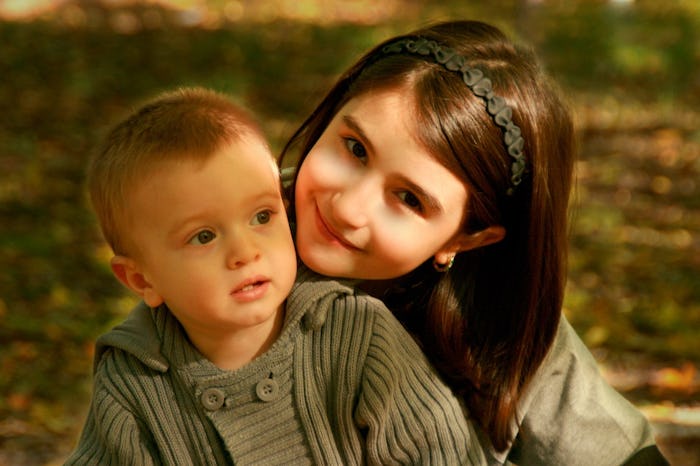As an only child, I always craved the kinship of a sibling. I wanted that special person who could make jokes about my parents with me while we wore matching Christmas pajamas. So when I started my family, I knew I'd have at least two kids close together, who would be best of friends. Well, my boys are 15 months apart and they fight each other like UFC professionals. Clearly not the idyllic image I had in mind. I started to second guess my decision and couldn't help but wonder: are siblings born farther apart, closer? Because my boys seem less like besties and more like opponents in a death match.
Now, it's hard for me to measure how close my boys will be in the future. They're still young and have a life time of togetherness to bond them. But what about siblings that have more years between their births? What special ways do they relate to one another and is it the amount of space between them that influences their relationship? This is something that researchers have been curious about for years, and the results of how spacing and birth order affect sibling dynamics are interesting to learn.
According to Mayo Clinic, medical professionals have been recommending putting a minimum of 18 months between pregnancies for years. But these reason are purely for maternal health purposes, and was originally suggested to decrease the amount of risks and problems a woman could experience from back-to-back pregnancies. Interestingly enough, there are some correlations to age spacing and the level of conflict between siblings. "Siblings who are close in age have high access to one another and are more likely to be physical with one another," according to the Center For Parenting Education pointed out. "Siblings who are spaced further apart have less access to one another and tend to be less competitive because they usually spend less time together, are interested in different things, and are involved in different activities."
Another interesting finding is that when siblings are spaced more than two years apart, the older child scores higher on standardized tests, according to research conducted at the University of Notre Dame. These researchers also found that the younger child's test scores seemed to be unaffected by the circumstances, reinforcing the potential for less sibling rivalry. Although it seems close to impossible to rule out competition in some form between siblings, the way it manifests differs depending on the gap in age.
According to Psychology Today, when there is 10 or more years between births, the older child can experience the same emotions as a younger child. This means that even though an older child has a better understanding what it means to bring a new baby in the home, they can still experience jealousy and anger over loosing the exclusive attention from their parents. However, these feelings can make them feel ashamed or guilty because of their age, so they are less likely to express them outright.
Although it's hard to tell if siblings born farther apart have closer relationships than those born close together, it is safe to say they have less to argue about and more autonomy. As Parenting magazine pointed out, once kids are in school, they are building their own social networks and depend less on their parents to meet all their needs, which allows parents to give the baby the attention it requires. Even if there is no magic solution for spacing your children, knowing how larger gaps affect sibling dynamics can be a good resources when deciding what will work for your family.
